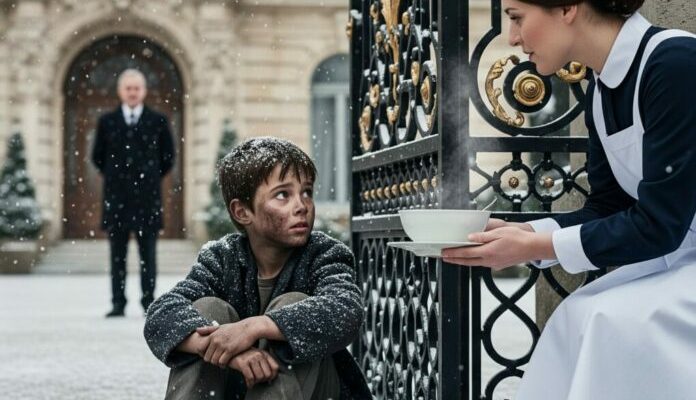On a quiet gray afternoon in Boston, Claire Bennett, the housekeeper at the grand Harrington estate, was sweeping the marble steps when she noticed a small boy standing at the gate.
He looked lost—barefoot, thin, and trembling in the cold. His clothes were torn, his face pale, and his arms wrapped tightly around his chest.
Claire hesitated. Her employer, William Harrington, one of the city’s most respected businessmen, was supposed to be away for meetings all day. No one would notice if she helped the boy, just for a few minutes.
“Are you lost, sweetheart?” she asked softly.
The boy shook his head. His lips were blue from the chill. Claire felt her heart ache. Without thinking twice, she opened the gate and led him inside.
“Come with me,” she whispered. “Let’s get you warm.”
In the mansion’s kitchen, Claire quickly served a bowl of hot stew and placed it before him. “Eat, darling,” she said kindly.
The boy’s hands trembled as he lifted the spoon. Within moments, he was eating as though he hadn’t had a proper meal in days. Claire watched in silence, grateful that she could offer something as simple—and as important—as comfort.
But just then, the sound of the front door slamming echoed through the house. Claire froze. Mr. Harrington had come home early.
The polished footsteps grew louder until he appeared in the kitchen doorway. His eyes widened as he saw the scene before him: the maid standing nervously by the stove, and a small, ragged boy eating from one of his porcelain bowls.
“Mr. Harrington, I—I can explain—” Claire began, her voice trembling.
But William raised his hand gently. His gaze shifted to the boy. “What’s your name, son?” he asked quietly.
“Eli,” the boy whispered.
A silence followed. Claire expected anger or dismissal, but instead, William nodded. “Finish your meal, Eli. No one should be hungry in my home.”
Claire exhaled in disbelief. Her employer—known for his strict rules and distant demeanor—had shown compassion instead of punishment.
Over the next few hours, William stayed close by, asking Eli questions about where he lived and how long he’d been on his own. When Eli confessed that he had been sleeping behind a store and had no family, William’s expression softened.
“You’ll stay here tonight,” he said firmly.
From that moment, something in the mansion changed.
Days turned into weeks. William arranged for social workers to help find out more about Eli’s background, but no records were ever found. In time, the boy became part of their household. Claire helped him with his meals and schooling, while William began spending time teaching him to read, count, and draw.
The once-silent mansion slowly filled with laughter. William, who had lived most of his life surrounded by wealth but very little warmth, found himself looking forward to the sound of Eli’s footsteps in the hallway.
One evening, as they watched the stars from the balcony, Eli asked quietly, “Will you be my dad?”
William’s eyes softened. He knelt beside the boy. “I’ll do my best,” he said, his voice unsteady with emotion.
Months later, after long meetings, paperwork, and countless visits from child welfare officials, William officially adopted Eli. That day, the three of them—William, Claire, and Eli—went out for dinner to celebrate.
Eli wore a new navy suit. Claire, radiant in a simple dress, could hardly stop smiling.
That night, as William tucked Eli into bed, the boy whispered, “Thank you, Dad.”
William smiled. “No, Eli. Thank you—for giving this house a heart again.”
From then on, the Harrington mansion was no longer just a symbol of wealth and success. It became a true home—filled with love, laughter, and the power of kindness.
Claire’s small act of compassion had changed everything. One warm meal had brought together three lonely hearts—and created a family that would last a lifetime.




